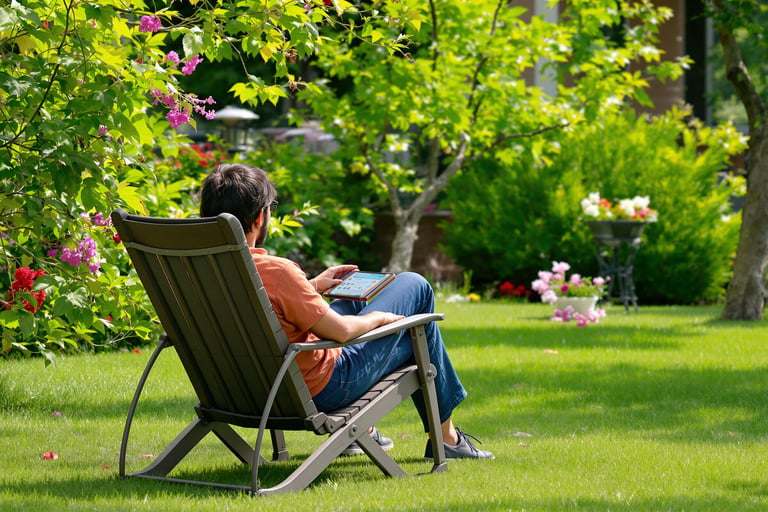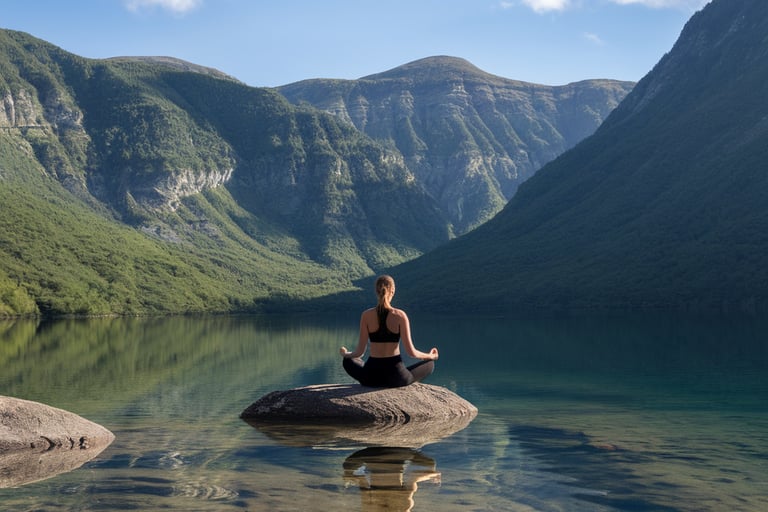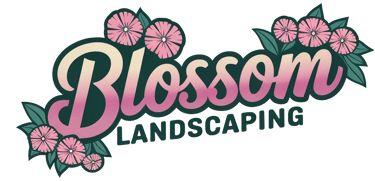
Your Home Landscape and Its Surprising Effect on Your Mental Health
12/18/20247 min read
The gentle sound of rain falling on broad Japanese maple leaves, the sweet fragrance of native flowering currants in spring, and the soothing sight of well-maintained gardens – these elements of your Vancouver home's landscape do more than just enhance your property's curb appeal. They play a crucial role in supporting your mental health and overall well-being.
Why Vancouver's Landscape Matters More Than Ever
In our bustling city, where the pace of life continues to accelerate and where we experience significant rainfall for nearly half the year, creating an outdoor sanctuary has become increasingly important. According to the Vancouver Coastal Health's mental health resources, time spent in nature significantly reduces stress levels and improves overall mental well-being.
The Science Behind Landscape and Mental Health
Research conducted at the Canadian Association of Psychology has shown that individuals who spend time in well-designed outdoor spaces experience reduced cortisol levels – the body's primary stress hormone. This is particularly relevant for Vancouverites, who often struggle with seasonal affective disorder (SAD) during our grey, rainy months.
Creating Your Mental Wellness Garden
Water Features and Mental Calm
In Vancouver's urban environment, the strategic placement of water features can mask city noise and create a peaceful atmosphere. Local landscape designers from Greater Vancouver Landscaping Association recommend incorporating rain chains (kusari-doi) or small fountains that complement our natural rainfall, creating a year-round sensory experience that promotes relaxation.
The healing properties of moving water are well-documented, and in our coastal city, incorporating water features that work with our natural precipitation patterns can create a seamless connection to nature. Many Vancouver homeowners are now installing rain gardens that not only manage stormwater but also create peaceful, contemplative spaces.
Color Psychology in Your Garden
Vancouver's climate allows for an impressive variety of plants that can be used to create specific emotional responses. The team at UBC Botanical Garden suggests incorporating plants that provide year-round color to combat the grey days of winter:
Early spring: Plant native flowering currants and Pacific rhododendrons for bursts of pink and purple
Summer: Include lavender and salvias for calming purple tones
Fall: Add Japanese maples for striking red and orange foliage
Winter: Incorporate evergreen plants like Oregon grape for consistent green coverage
Sensory Engagement Through Plant Selection
The most effective therapeutic gardens engage all the senses. In Vancouver's mild climate, we have the unique opportunity to create gardens that remain engaging throughout the year. Working with local nurseries like GardenWorks, you can select plants that provide multiple sensory benefits:
Tactile stimulation comes from soft, touchable plants like lamb's ears, which thrive in our climate when properly placed in well-draining soil. The texture of various ornamental grasses, which perform exceptionally well in our coastal environment, can provide both visual and tactile interest.
Aromatherapy in the Garden
Vancouver's moderate climate is perfect for growing a variety of aromatic plants. Herbs like rosemary, thyme, and mint not only provide wonderful scents but also thrive in our local growing conditions. These plants can be strategically placed near walkways and sitting areas to maximize their therapeutic benefits.
Creating Mindful Spaces in Your Vancouver Landscape
Privacy and Mental Peace
In Vancouver's increasingly dense neighborhoods, creating private outdoor spaces is crucial for mental well-being. The City of Vancouver's Guidelines for Privacy Landscaping provide excellent frameworks for establishing peaceful retreats. Consider incorporating bamboo screens or native cedar hedges, which thrive in our coastal climate while providing year-round privacy and sound buffering.
Therapeutic Garden Design Principles
Incorporating Meditation Spaces
With Vancouver's mild climate, outdoor meditation spaces can be utilized nearly year-round. Local landscape architects recommend creating covered areas using structures like pergolas with clear polycarbonate roofing, allowing for outdoor enjoyment even during our rainy season. The Vancouver Park Board's VanDusen Botanical Garden offers excellent examples of meditation-friendly spaces that work within our climate.
Light and Shadow Play
Understanding light patterns is crucial in Vancouver's northern latitude. Working with a certified landscape designer from the BC Landscape and Nursery Association can help you maximize natural light during our darker months while creating comfortable shade for summer enjoyment. Strategic placement of deciduous trees like Vine Maples allows winter sun while providing cooling shade in summer.
Managing Seasonal Affective Disorder Through Landscape Design
Vancouver's notorious grey winters can significantly impact mental health. Combat this by incorporating:
Winter-Blooming Plants
The mild Pacific Northwest climate allows for winter-flowering plants like witch hazel, winter jasmine, and hellebores. These provide crucial color therapy during our darkest months.
Reflective Elements
Installing mirrors or metallic garden art can help amplify limited winter light. Local artisans at the Circle Craft Co-operative create weather-resistant pieces perfect for our climate.
Creating Movement in the Garden
Wind-responsive plants like ornamental grasses and Japanese forest grass (Hakonechloa) add dynamic movement to gardens, providing gentle animation that research shows can reduce anxiety. These plants are particularly well-suited to Vancouver's coastal conditions.
Sustainable Design for Long-Term Well-being
Environmental Consciousness
Working with local companies like Western Turf Farms for eco-friendly lawn alternatives can help create a landscape that not only supports mental health but also environmental sustainability. This alignment of values often leads to increased satisfaction and reduced anxiety about environmental impact.
Rain Garden Integration
Given Vancouver's significant annual rainfall, incorporating rain gardens can transform a potential source of stress (water management) into a beautiful, mind-soothing feature. The City of Vancouver's Green Infrastructure Guidelines provide excellent resources for creating these therapeutic water features.
Maintenance Considerations for Mental Well-being
Low-Stress Garden Design
Working with local landscape maintenance experts can help design a garden that provides maximum therapeutic benefit with minimal stress. Companies like Para Space Landscaping understand Vancouver's unique maintenance challenges and can create sustainable, low-maintenance designs.
Maximizing Mental Health Benefits Through Strategic Plant Selection
Native Plants for Peace of Mind
Vancouver's native plants have evolved to thrive in our unique climate, making them inherently low-stress choices for your therapeutic garden. The Native Plant Society of British Columbia recommends several species that support both mental well-being and local ecology:
Western Red Cedar provides year-round screening and releases calming aromatic compounds, especially after rain. This iconic Pacific Northwest tree creates a sense of connection to our regional identity and natural heritage. When properly placed, it requires minimal maintenance while offering significant psychological benefits through its presence and fragrance.
Sword Ferns offer evergreen structure and movement, thriving in Vancouver's shaded areas. Their resilience through our wet winters provides a reassuring constant in the garden, while their unfurling fronds in spring offer fascinating displays of natural growth patterns that can aid in mindfulness practices.
Seasonal Support for Year-Round Mental Wellness
Working with Vancouver's distinct seasons rather than against them can significantly reduce garden-related stress while maximizing therapeutic benefits.
Winter Wellness Strategies
During Vancouver's darker months, focus on plants and features that provide sensory engagement:
Snow-covered ornamental grasses catch winter light, creating beautiful morning frost displays. Local landscape designers often recommend Miscanthus varieties that stand strong through winter storms while providing visual interest.
Install landscape lighting designed by certified professionals from the Landscape Lighting Certification Program to extend outdoor enjoyment during our long winter evenings. Strategic lighting can combat seasonal affective disorder while creating magical nighttime garden scenes.
Spring Revival
As Vancouver emerges from winter, your garden can support mental renewal:
Pacific Bleeding Heart naturally emerges early, providing hope and color when most needed. Their heart-shaped flowers offer particular emotional resonance during the transition to spring.
Professional Support for Mental Well-being
Engaging with Landscape Professionals
Working with certified landscape professionals can significantly reduce the stress of garden maintenance. The British Columbia Landscape & Nursery Association maintains a directory of qualified professionals who understand our unique growing conditions and can help maintain your therapeutic landscape.
Creating a Maintenance Schedule
Develop a realistic maintenance calendar that aligns with Vancouver's climate patterns and your personal capacity. Local experts recommend:
Monthly check-ins with your landscape maintenance team
Quarterly major maintenance sessions
Annual review and adjustment of your therapeutic garden plan
Expert Tips for Maximum Mental Health Benefits
Morning Light Optimization
Position seating areas to capture morning light, particularly important for managing seasonal affective disorder during Vancouver's darker months.
Sound Management
Work with local water feature specialists to create sound barriers against urban noise. The constant sound of moving water can mask traffic while providing therapeutic benefits.
Fragrance Zoning
Consult with Vancouver garden centers like Art's Nursery to select aromatic plants that release their scents at different times, creating an ever-changing sensory experience.
Connecting with Community
Garden-Based Mental Health Resources
The Vancouver Park Board offers community programs that complement private therapeutic gardens. Participating in these programs can enhance the mental health benefits of your home landscape while building valuable community connections.
Professional Mental Health Integration
Consider working with local horticultural therapists who can help maximize the mental health benefits of your landscape. The Canadian Horticultural Therapy Association provides resources and professional connections. Or even to synergize with your landscape you can work with yoga services like Lucy St John's Yoga.
Your Vancouver garden can be more than just an outdoor space – it can be a crucial tool in maintaining and improving your mental health. By thoughtfully designing and maintaining your landscape with these principles in mind, you create a powerful resource for daily well-being.
Ready to transform your outdoor space into a mental wellness sanctuary? Contact local landscape professionals who understand Vancouver's unique climate and mental health needs. They can help create a personalized plan that maximizes both the therapeutic potential and sustainability of your garden.
FAQ Section:
Q: How long does it take to see mental health benefits from a therapeutic garden?
A: Research shows that even 10-15 minutes of time spent in a well-designed garden can reduce stress hormones. Long-term benefits typically develop over 3-6 months of regular garden interaction.
Q: What are the best low-maintenance plants for a therapeutic garden in Vancouver?
A: Native plants like Salal, Oregon Grape, and Western Sword Fern offer year-round interest with minimal maintenance requirements.
Q: How can I maintain my therapeutic garden during Vancouver's rainy season?
A: Focus on proper drainage installation, covered seating areas, and rain-tolerant plants. Consider working with a professional landscape designer who understands our local climate challenges.
Q: What's the most cost-effective way to start a therapeutic garden in Vancouver?
A: Begin with a small meditation space featuring native plants and gradually expand. Many local nurseries offer planning services to help develop a long-term strategy within your budget.






Contact
Blossomscaping@gmail.com
+1-604-339-9217
© 2024. All rights reserved.
Where we service
3158 W 34th Ave, Vancouver, BC V6N 2S2
UBC - Cambie - Dunbar - West Vancouver - North Vancouver - West Point Grey - Shaughnessey - Richmond - Kerrisdale - South Vancouver - East Vancouver - Kitsilano - Burnaby - Mount Pleasant - Oakridge - Arbutus Ridge - Marpole - Southlands - Victoria-Fraserview


Proudly Servicing Vancouver, British Columbia
What we service
